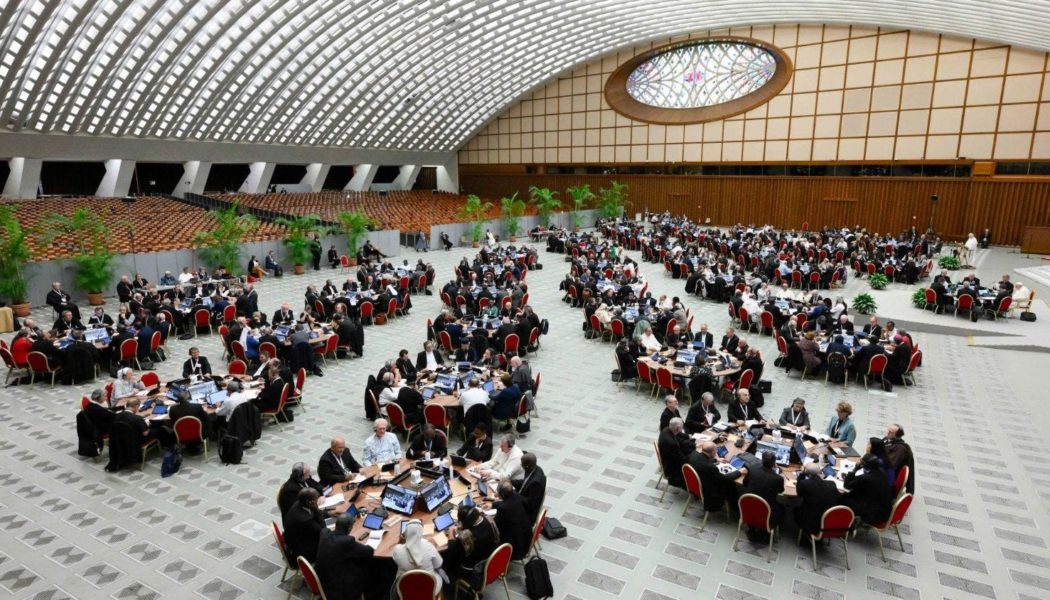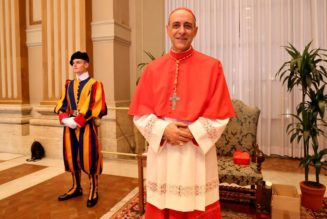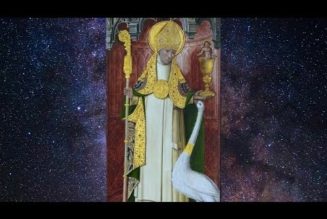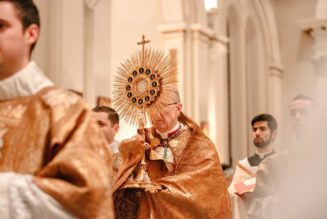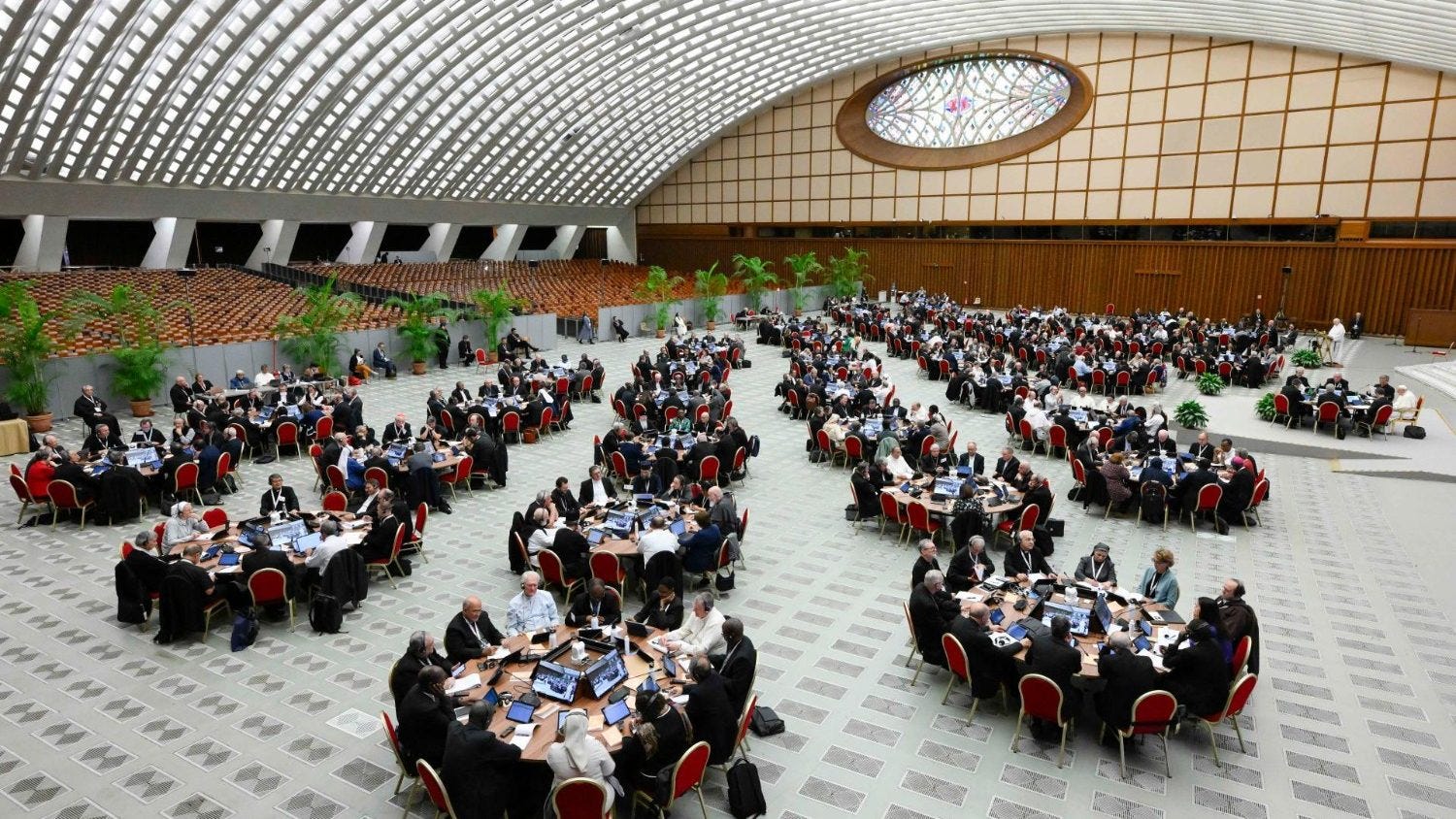
As the synodal sessions in Rome approach their half-time break, participants are preparing to vote on the text of an interim report on their work. The assembly has also decided to issue a “Letter to the People of God” — a novelty, given the make up of the institution.
The synodal assembly’s decision to address the whole Church on its own behalf is remarkable for a body which exists as a consultative help to the pope, and whose conclusions are meant to be subject to his discernment and authority.
Do attendees in Rome see themselves as dependent on Francis for legitimacy? Or is the body now setting itself up as its own voice, separate from the pope, and pursuing its own agenda?
If the latter, does it risk deepening the ecclesiastical divides the synodal process was meant to heal?
—
Bishop Franz-Josef Overbeck of the Diocese of Essen used a synodal press conference Saturday to praise the German synodal way, which concluded recently despite consistent criticism from the Vatican and Pope Francis.
The bishop offered the German process as a model for the Church, despite Rome and the pope having said it not truly synodal at all, but an elitist and self-appointed institution aimed at supplanting the Church’s hierarchy.
That notwithstanding, Overbeck said, the German process was particularly suited to the “post secular” situation of the Church in Germany, but also as a template for the synod to break with “habit and tradition” and explore “other solutions” for living the “ecclesial spiritual experience.”
The bishop also nodded to the creation of a permanent synodal assembly — a plan which the Vatican has repeatedly opposed. According to Overbeck, the focus of the synod should be (as it was in Germany) for institutional reform “to make the Christian proclamation credible.”
As a statement of purpose, it is not novel; the German synodal way has been making this same case for several years.
It is unusual that Overbeck and other synodal delegates have made these arguments in Rome as the synod discusses the themes of “participation, governance, and authority,” but without seeming to pay much attention to Francis’ own thoughts on the subject.
In 2019, as the German synodal way was in its early phases, Pope Francis wrote a letter to the entire Church in the country, in which he warned that “what we need is much more than a structural, organizational or functional change.”
“One of the first and greatest temptations in the Church [is] to believe that the solutions to current and future problems would come only from purely structural or bureaucratic reforms,” Francis wrote to German Catholics, calling it “a sort of new Pelagianism, which leads us to place trust in administrative structures, in perfect organizations.”
The pope specifically warned that the desire to reinvent the Church’s hierarchical constitution and organizing structures in favor of what Overbeck on Saturday called “other solutions” for living the “ecclesial spiritual experience” clouds and complicates the Church’s missionary dynamic.
But according to Overbeck’s thinking, as he expressed it on Saturday, the pope’s focus on evangelization is unworkable, and either naive or uninformed.
If there are “unmediated and irreconcilable contradictions” between “theology, the Magisterium, or tradition and the signs of the times,” the Church “will not convince anyone and cannot provide guidance to Catholics,” the bishop said.
It’s a line of reasoning echoed by other synod participants.
“For a synodal Church to live up to the aspiration of being a Church where all are welcome, we need to ask ourselves the question if this can be achieved as we currently function as church [sic] and within the parameters of current Church teaching, or is change necessary?” asked one of the synodal small discussion groups in a table report earlier this month.
While Francis has been clear he wants to hear discussion of how the Church can become more “synodal” in all aspects of its life, he has been equally clear that changing doctrine is not on the table.
In fact, the pope has insisted that synodality should be focused on the opposite consideration and be a way for the Church to “interrogate herself with regard to her fidelity to the deposit of faith”; in short, to examine whether the Church is living up to her doctrine, which comes from God’s own revelation, and not asking whether God’s revelation is falling behind the times.
More recently, Francis has addressed exactly the concerns that Bishop Overbeck seemed succinctly to articulate on Saturday — that in a “post secular” age the Church’s teaching is too out of step with the world to be accepted.
“Many times true Catholic doctrine scandalizes — how scandalous is the idea that God became flesh, that God became man, that Our Lady preserved her virginity. This scandalizes,” Pope Francis observed in an in-flight press conference last month, while juxtaposing the “scandal” of true doctrine versus a sanitizing of teaching to make it more acceptable, motivated by ideology.
“Catholic doctrine sometimes scandalizes. Ideologies are all ‘distilled’ and never scandalize,” said the pope.
—
Of course, the assembly members are free to take issue with Pope Francis’ vision of the process. And the pope has himself made it clear he wants the meetings’ discussions to be free flowing affairs, with minority and even dissenting voices given the chance to be heard.
Free and frank discussion is not, synodal organizers and participants have repeatedly stressed, something to fear, since the synodal body itself is charged only with presenting Pope Francis with thoughts, ideas, and recommendations for him to consider.
Pope Francis has made clear that “the synod is not a parliament” so many times it has become almost a cliche, but his point about reaching a majoritarian consensus, forging political compromises, and forming resolutions to contentious issues being all anathema to the assembly is important.
Bishop Daniel Flores, attending the synod from the United States, made this point last week. “I have simply heard honest, sincere, faithful, charitable conversations ‘sub tutela Petri‘ — under the care of Peter,” he said. Because the synodal dialogue is under the pope’s authority, it is “not a threat to the faith,” he said.
Other bishop participants have made the same point. “It is a synodality, at the center of which there is the chair of Peter, the pope,” said Archbishop Dabula Anthony Mpako of Pretoria, speaking at the same press conference as Flores. “At the end of the day, hierarchy goes together with synodality.”
This summation could be even more precisely phrased by saying that the hierarchy makes synodality, since the synodal assembly has no legal status on its own.
As a purely consultative body convened by the pope, the synod exists only on the terms the pope defines, and expresses itself only in relationship to him. As such, the question of whether one or other synodal view could command a majority ought to be moot, since it is only Francis who can speak to the whole Church in the light of the synodal discussions, or grant them any kind of authority or authenticity.
That, at least, is the theory.
Many of the synod’s more enthusiastic supporters and promoters have adapted the pope’s call for the assembly to be open to the Holy Spirit to argue the body’s deliberations are some kind of authoritative expression of either the sensus fidei or of the Spirit itself. That has raised concerns among many Church watchers, including prominent cardinals, who have voiced the worry that the synod is setting itself up as exactly the kind of parliament Pope Francis has said it cannot be, and claiming a kind of spiritual authority of its own.
Those criticisms will be seen by many to be justified, given the decision by the synodal body to draft a “Letter to the People of God” as part of its current session. That decision was announced last week by the synod’s permanent secretariat, with few details given about the letter.
While it remains to be seen what such a letter will say, for many the simple fact that the assembly has assumed for itself a kind of independent identity, separate from the pope, and decided it can address “the People of God” on its own behalf, is striking.
Within the Church’s ecclesiology and canon law, the current synodal session is a meeting of the synod of bishops, albeit one augmented by the inclusion of voting lay participants. The synod of bishops is itself entirely dependent on the pope for its scope and the subjects it addresses, according to canon law. While it can and should discuss questions put to it by the pope and “express its wishes” to him, the synod cannot “resolve them, or issue decrees about them.”
The synod’s decision to address the entire Church on its own authority will likely strike many observers, especially canonists, as a consultative body acting apart from its head, the pope — something much more important and authoritative bodies, like the College of Bishops or an ecumenical council, are expressly forbidden from ever attempting.
To the extent that this step has been taken on the synod’s own authority, which according to the secretariat it seems to have been, such a “Letter to the People of God” will and perhaps should set alarm bells ringing that the assembly is claiming for itself an identity and legitimacy independent from the pope.
While it might not be a decision taken with the intention of challenging Francis’ authority, or setting out to confront the pope’s own eventual conclusions, it is a precedent that would seem to pave the way for doing exactly that.
Even assuming the best of intentions by all in the assembly, the presumption of that body to start issuing missives to the faithful on its own behalf is, at the very least, likely to amplify claims that it exists apart from its relationship to Francis, can speak on its own behalf, and it’s conclusions should have their own special weight.
Looking ahead to the synod’s conclusion next year, there will need to be some resolution to the body’s current debates on women’s ordination, LGBT issues, and other controversial matters.
Knowing that the synodal documents will now likely be read as a kind of authoritative conclusion, rather than speculative recommendations, synodal members are likely to contest the wording of every paragraph even more keenly than before — with a mounting insistence on exactly the kind of parliamentary majority building Francis has decried.
And what will happen if the final text of the assembly proposes ideas or changes for the Church which the pope declines to adopt?
In synods past, it was understood that a recommendation from the assembly only gained legitimacy if and when the pope made it his own.
Now, with the body issuing letters to all the Christian faithful in its own name, at least some will treat its conclusions as carrying their own authority. And it seems likely — if not inevitable — that Francis will be accused by some of ignoring the “Holy Spirit” if he fails to adopt the synod’s recommendations in full.
Whether by accident or design, the synod now appears to be growing into a rival pole of authority to the Bishop of Rome, under whose authority and care it is meant to exist.
Comments 18
Services Marketplace – Listings, Bookings & Reviews
